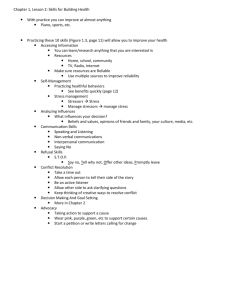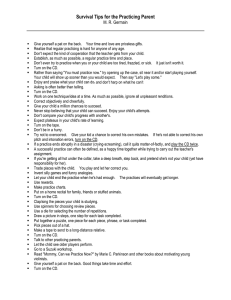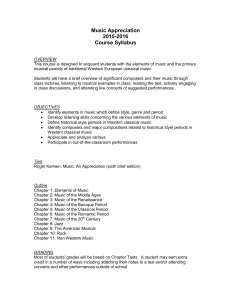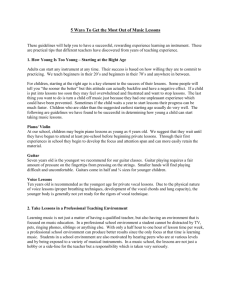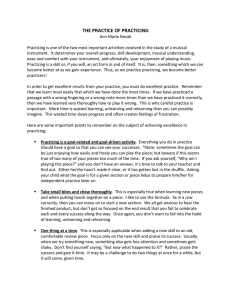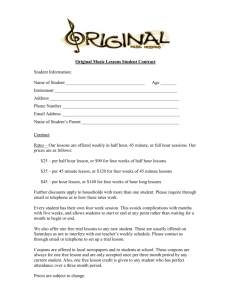Music 195, 196, 197, 396, 397 Section 001, Individual Piano Lessons
advertisement
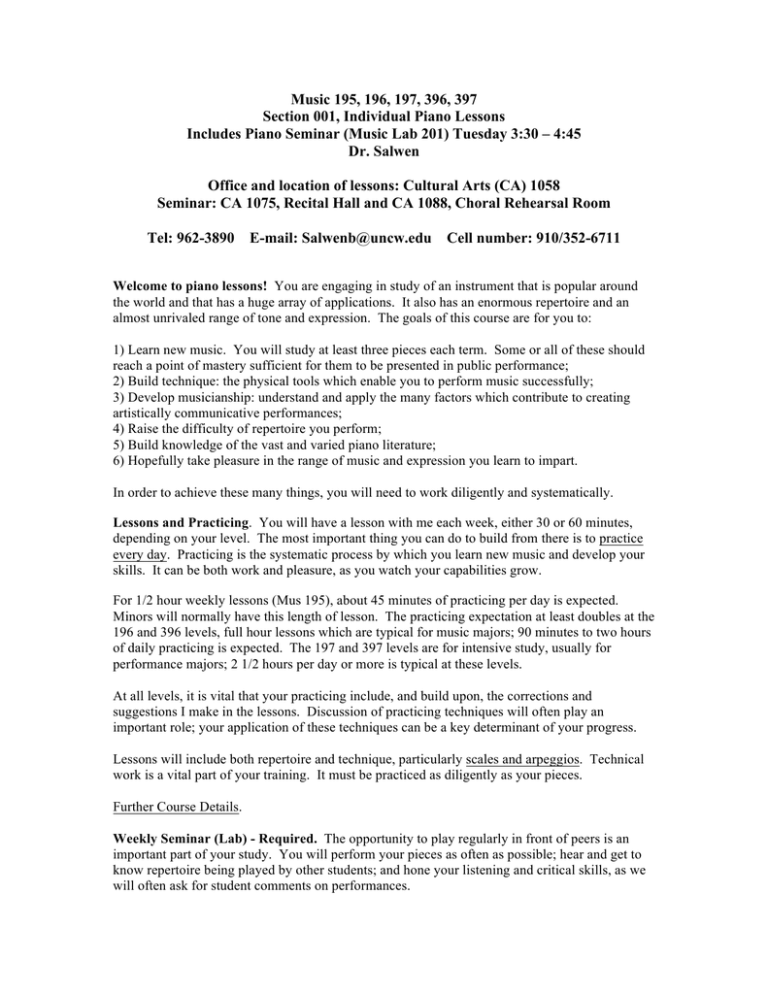
Music 195, 196, 197, 396, 397 Section 001, Individual Piano Lessons Includes Piano Seminar (Music Lab 201) Tuesday 3:30 – 4:45 Dr. Salwen Office and location of lessons: Cultural Arts (CA) 1058 Seminar: CA 1075, Recital Hall and CA 1088, Choral Rehearsal Room Tel: 962-3890 E-mail: Salwenb@uncw.edu Cell number: 910/352-6711 Welcome to piano lessons! You are engaging in study of an instrument that is popular around the world and that has a huge array of applications. It also has an enormous repertoire and an almost unrivaled range of tone and expression. The goals of this course are for you to: 1) Learn new music. You will study at least three pieces each term. Some or all of these should reach a point of mastery sufficient for them to be presented in public performance; 2) Build technique: the physical tools which enable you to perform music successfully; 3) Develop musicianship: understand and apply the many factors which contribute to creating artistically communicative performances; 4) Raise the difficulty of repertoire you perform; 5) Build knowledge of the vast and varied piano literature; 6) Hopefully take pleasure in the range of music and expression you learn to impart. In order to achieve these many things, you will need to work diligently and systematically. Lessons and Practicing. You will have a lesson with me each week, either 30 or 60 minutes, depending on your level. The most important thing you can do to build from there is to practice every day. Practicing is the systematic process by which you learn new music and develop your skills. It can be both work and pleasure, as you watch your capabilities grow. For 1/2 hour weekly lessons (Mus 195), about 45 minutes of practicing per day is expected. Minors will normally have this length of lesson. The practicing expectation at least doubles at the 196 and 396 levels, full hour lessons which are typical for music majors; 90 minutes to two hours of daily practicing is expected. The 197 and 397 levels are for intensive study, usually for performance majors; 2 1/2 hours per day or more is typical at these levels. At all levels, it is vital that your practicing include, and build upon, the corrections and suggestions I make in the lessons. Discussion of practicing techniques will often play an important role; your application of these techniques can be a key determinant of your progress. Lessons will include both repertoire and technique, particularly scales and arpeggios. Technical work is a vital part of your training. It must be practiced as diligently as your pieces. Further Course Details. Weekly Seminar (Lab) - Required. The opportunity to play regularly in front of peers is an important part of your study. You will perform your pieces as often as possible; hear and get to know repertoire being played by other students; and hone your listening and critical skills, as we will often ask for student comments on performances. The seminar also provides a forum for a variety of other piano-related topics and activities; baroque ornaments, techniques for memorizing, and the life and works of Liszt, are examples of the types of discussions we have had in the seminars. Finally, and of great importance, the seminars are the proving ground for music you are going to play in public. It is here that you try out your pieces, find the strengths and weak spots in your performances, and try again. At the end of that process you should be prepared to play successfully on a departmental recital, in your jury, and perhaps in that semester’s honors recital. Regular attendance at seminars is expected; absences will tend to reduce your grade. I will typically ask you in advance to be prepared to perform; then it is important that you do so. The seminars are held Tuesdays from 3:30-4:45, sometimes in the Cultural Arts building recital hall, sometimes in room 1088. On the last Tuesday of the month, a seminar is held for the entire music department (the departmental seminar). Attendance here is required, just as at the weekly sessions. Concert attendance. Attendance at eight (8) concerts each semester are required as part of your study. Two of these may be performances in which you participate. Please submit programs to me by term’s end. Your grade will be lowered one level (A- becomes B+, for example) if you attend 6 or 7 concerts. For fewer than 6 concerts, your grade drops two levels. As mentioned above, hearing concerts is one of the central aspects of your training as a musician. Go to more than eight if you can. Jury. At the end of each semester you will perform for the piano faculty. This is the point where your work is demonstrated most fully. It is the performance minimum for each semester; it is hoped that you will perform in public as well as at juries. Normally you will be heard by three or four faculty including myself. The jury includes three pieces, in different styles, that you have worked on in the current semester; your jury grade equals 25% of the semester grade. That grade will be based on the jury performance itself, not on your progress over the course of the term. As such, it is important to build successful stage skills on an ongoing basis, such that you will be equipped to give a successful jury. Creating musical growth and progress. Practice daily. Practice technique daily. Practicing every day – or as close as you can come to that – is the way to reinforce and build skills and confidence. Also, basics never go out of style. It bears repeating: Scales and arpeggios are the fundamentals of instrumental mastery. In lessons we will give them a good deal of attention; your practicing needs to do so as well. There are certain key principles of practicing, things that you will hear from me often and will need to apply frequently. This is not an all-inclusive list, but will serve you well in an ongoing way. 1) Practice slowly! There is no better way to think and listen than to play slowly and concentrate on what you are trying to accomplish. 2) Once you become more fluent, use a variety of speeds. This builds your control over your fingers. 3) Practice hands separately. The surest route to mastering compound challenges is to grasp their constituent parts. 4) Concentrate! Practicing needs to be focused and learning-oriented. Put your attention fully on what you are doing at the piano. Practice in segments which make this possible. An hour at a time is a good general recommendation, followed by a short break. This keeps you fresh. Go to concerts! This is required of music majors, but is an essential ingredient for anyone’s musical knowledge and growth. Go to as many as you have time for. Hear a variety of performances on different instruments and in different styles. We have a great many concerts right here in the department. They are typically of high quality, ranging from student recitals to faculty performances to presentations by guest artists. Take advantage of this; it is enormously enriching and vital. Listen to music on recordings. Obviously concerts cannot offer you all the music you might like to hear. Listen, listen, listen. This applies both to music you are studying, and to hearing music broadly as an experience. We have thousands of CDs in the library. There are thousands of works in the Classical Music Library, the online database accessible through the Randall Library webpage. And the resources of YouTube are almost endless – as is the range of quality of the material. Work on memorizing your music once you have started to absorb it – typically after a few weeks. That gives it time to assimilate and integrate. Since memorizing is required for some portion of every term’s repertoire, this is something you should be thinking about reasonably early on. Some nuts and bolts. General Procedure and Grading. At the start we will find appropriate material for you to study. There is no fixed text because individual background and abilities differ widely. Assuming suitability to our setting, I am happy to include your specific interests in choosing music. As in any other course, you will receive a grade. This grade will be based largely on the work we do together in the lessons. Hopefully your daily practicing will bring significant, continuing progress. In assigning a grade, I look at a) the amount of music learned during the term; b) the musical and technical quality of the performances; c) musical and technical growth over the course of the term; d) the consistency of your work; e) your final jury grade, which equals 25% of the total. Scheduling and Attendance. Your one-on-one weekly lesson will be held at a mutually convenient time. For the duration of the term, that will be your time. It should be obvious that missing lessons will reduce your progress and your grade. If you must miss a lesson for any reason, do not fail to call or email - at least a few hours ahead. It is irksome to wait for someone who does not come, or to be notified of an absence at the last minute. Whenever possible, we will reschedule a missed lesson; this is always better than losing it. So please be prepared to suggest a new time, but limit rescheduling to occasions of true necessity. At times, I also may need to reschedule lessons, and will try to arrange a replacement time well in advance. Contact and Discussion. As this is an individualized study, you may want to discuss individual questions or interests with me. This can be done in lessons, but is better done at another time, so that we can focus your lesson on the music. Feel free to call or email me any time that you have a question or would like to discuss musical matters or your work. In general you should reach me easily at the office. I am here afternoons and often into the very late evening. Voice mail is always on when I am out. I usually respond to emails promptly. Contacting me at the office will, therefore, normally get you in touch with me quickly. You may call my cell number, but please confine such calls to situations needing early attention, when you have not been able to reach me at the office. Public performance. Work hard, prepare thoroughly, get out there, and have fun! As mentioned above, public performance is one of the goals of your study. It validates your hard work and gives others the opportunity to appreciate what you have accomplished and what you can communicate. The more you perform, the better you are likely to become at doing it. Enjoy the piano!
